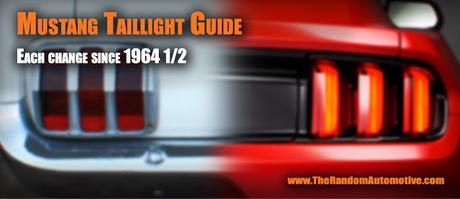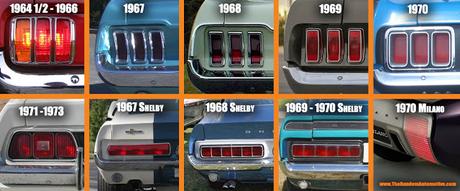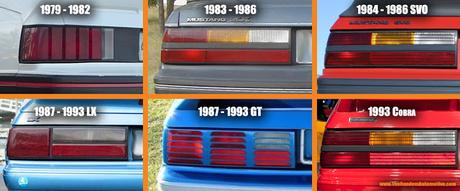
Some cars are built to look different, while some are built to get from point A to point B.As some of you may know, I am a huge Mustang fun.They look great (some generations), they function well, and they do get you from point A to point B, but with character and fun.
A defining feature (at least for most generations) of the Mustang is the tri-bar taillight.Yes, the pony emblem obviously, but since that is located on the front and most of Ford’s competition sees the back, well then here is a guide to be able to identify Mustangs by their tail lights.
Keep in mind that I am writing this as a compilation of my research.I am not an expert, so while there shouldn’t be any mistakes, very minuscule details may slip past me.This is also about taillights straight from the factory.As time went on, and parts became more “modular”, taillights became one of the most customizable features of the Mustang in terms of aftermarket.
First Generation (1964 ½ - 1973)This is where it all started.It was an idea by a few great people: the men who built the Mustang.This is obviously where we first see the now famous tri-bar taillights.Shelby started changing the design in 1967 to an elongated version.While he sort of strayed from the tri-bar look, he nailed a great styling.
Now, I threw in the 1970 Mustang Milano concept for a couple reasons: one, to take up the last box and make everything even, and two, because it is probably my favorite looking Mustang (even though it doesn’t exist).

Second Generation (1974 – 1978)This was a dark time in Mustang history.A fuel crisis and government regulations hit, and killed the age of the muscle car.Cars needed to become smaller, more fuel efficient, and more practical.Enter the Mustang II.
It is important to note that there were special edition Mustangs during this generation, such as the Ghia, Mach 1, Cobra II, and King Cobra, but they all shared the same taillights with the year of the respective base Mustang II they were built off of.I have also seen an example online of all three bars being red, as opposed to the center being orange, but I can’t figure out if that was original or not.Aside from that, from what I can tell, they are all the same for this generation.

Third Generation (1979 – 1993)Enter the even more drastic change for Mustang.In the 80s, everything had to be a box.The Mustang was no exception.The Fox Body followed the small, boxy trend.Even though taillights in the past were three bars (which are boxes), that wasn’t good enough for the 80s.The taillights literally became boxes, and the classic tri-bar look was gone.Occasionally, if you looked hard enough, you may see a very slight triple barred scheme going on, but it’s a stretch to say the least to try and make the comparison.
The 1984 – 1986 SVO and 93 Cobra both had special pinstriped taillights.From 1987 to 1993, there were two different sets of lights: the LX had three boxes, and the GT had a louvered-like version.

Fourth Generation (1994 – 2004)So, we go from the 80s where everything was a box, to the 90s to where everything had to be round.Again, the fourth generation Mustang was no exception.At the beginning of this generation, there wasn’t a straight edge to be seen.Toward the end of the generation, the edges thankfully started to come back, especially at the rear.However, the tri-bar look for the taillights was back!Even though they started off at a different orientation…
1996 finally brought back the classic tri-bar layout.However, they looked more like elongated bubbles due to the 90s roundness.There were special edition Mustangs during this generation, but as far as I can tell, they shared the same taillights as their lower model counterparts of the same respective year.The only exception was the 1999/2001 Cobra.That model offered a slightly different taillight (with amber colors), but the 2003/2004 Cobra had that year’s standard taillight.

Fifth Generation (2005 – 2014)Finally Mustang went back to the retro look.That also includes the iconic taillights.Well, this at least applies up until 2009.After that, the tri-bar look still applied, but it was changed up.A cool feature was the integration of sequential turn signals later in the generation.Personally, the 2005 – 2009 and 2013 and 2014 taillights are some of my favorite of any generation.
Aftermarket really took off for these lights as well.Popular upgrades for the 2005 – 2009 included black out options and sequential plug and play kits.Even kits to resemble the 2013/2014 were made for the 2005 – 2009.Toward the end of the generation, LED taillights became standard.I would also argue to say that the 2013 and 2014 had some of the most thought and design go into the taillights.I could be technically wrong, but visually, that’s what it seems.
There were a crap ton of special edition Mustangs made during this time.The only one to really stray from the norm would be the Saleens of this generation (which simply blacked out the last bar).Even the Iacocca edition (which now sells from $100K to $352K) used the base taillights.That’s how awesome they were.

Sixth Generation (2015 – Present)2015 saw a complete overhaul of the Mustang from top to bottom, inside and out.It kind of went back to the roundness of the 90s unfortunately.Of course, the taillights were redesigned as well, and thankfully the classic tri-bar style was kept.It was redesigned to be quite a nice looking change as well.
What does Ford has in store for us in the future?Only time will tell, but hopefully they keep the classic tri-bar taillights.After all, since it is something that most people see in their day to day lives, why wouldn’t Ford make them badass and iconic?

Thanks for stopping by!Like what you see?Make sure you head on over and subscribe to our YouTube channel.Don’t forget to like us on Facebook, and be sure to follow us on Twitterfor some exclusive content!

